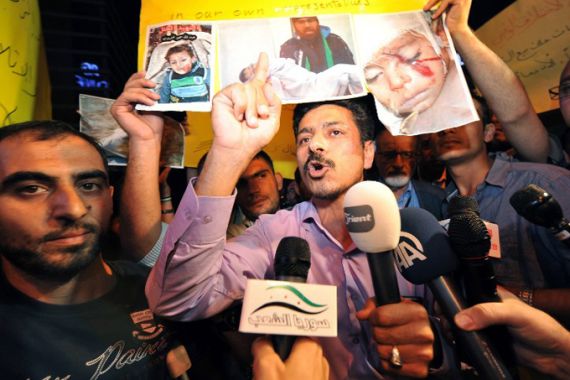Foreign envoys join Syria opposition talks
Officials try to break deadlock at Istanbul meeting as rebels renew calls for Assad’s exit before attending peace talks.

Turkish Foreign Minister Ahmet Davutoglu joined a meeting of Syria’s divided opposition in Istanbul, in what was seen as an effort to break the deadlock in talks to push the movement forward.
US ambassador to Syria Robert Ford and a top French diplomat on Syria attended the meeting of the main opposition National Coalition on Wednesday.
Veteran Syrian dissident Michel Kilo, head of a liberal bloc, also arrived at the Istanbul hotel alongside a top Saudi official.
Al Jazeera’s Rawya Rageh, reporting from Istanbul, said: “It’s very interesting that Kilo, a secular opposition figure whose internationally-backed bloc has been at the heart of the stalemate, arrived with these foreign officials and diplomats.”
Asked if there might be a breakthrough in talks, Kilo told our correspondent that “we’ll have to wait and see what the coalition members will offer,” and that if no decisions had been reached by the evening, “we will go home”.
After the first session ended, the opposition released a declaration of conditions before its members engage in proposed peace talks.
“The participation of the Syrians in any conference is tied to the presentation of a deadline for a solution and giving the necessary binding international guarantees,” said the statement.
“The Syrian Coalition welcomes the international efforts to find a political solution to what Syria has been suffering for two years while being committed to the principles of the revolution.”
Stalled meeting
Saudi Arabia wants the Coalition to expand in order to water down the influence of the powerful Muslim Brotherhood, and has backed Kilo’s bid to join the opposition group.
Opponents supported by regional rival Qatar, including the Muslim Brotherhood, have resisted the Saudis’ move.
A week into the chaotic Istanbul meeting, dissidents have failed to agree on any of the key talking points they were scheduled to resolve, chief among them the proposed peace conference that Washington and Moscow are trying to organise in Geneva next month.
The meeting has been stalled by what dissidents have described as conflicting international pressures on the Coalition.
Saudi Arabia, Qatar, France, Turkey and the United States all back the revolt against Syrian President Bashar al-Assad, but have conflicting visions for the National Coalition.
‘Worst crisis’
“Things are not moving. The opposition has hit its worst crisis yet,” said a Coalition member on condition of anonymity.
The meeting was also supposed to choose a new Coalition president, agree on an interim government and vote in new members to join the bloc, as well as reach a decision on the proposed Geneva conference.
Also on Wednesday, Navi Pillay, the United Nations’ human rights chief, urged countries not to supply Syria with weapons and to press both sides to find a political end to the war, to prevent more massacres and the threat to regional stability.
Her comments came after the European Union decided to let its arms embargo on Syria expire and Russia said it would deliver an advanced S-300 air defence system to the Damascus government despite US, French and Israeli objections.
Meanwhile, the US, Turkey and Qatar pushed through a UN resolution demanding a probe into the fighting around the Syrian town of Qusayr, near Lebanon, and condemnation of foreign fighters supporting President Bashar Assad.
The resolution approved by a vote of 36-1 in the UN Human Rights Council calls for urgent investigation into alleged abuses by government forces and Hezbollah fighters in Qusair, along with more aid access and civilian protections.
Only Venezuela voted against it. Eight other nations in the 47-nation council abstained; two were absent.